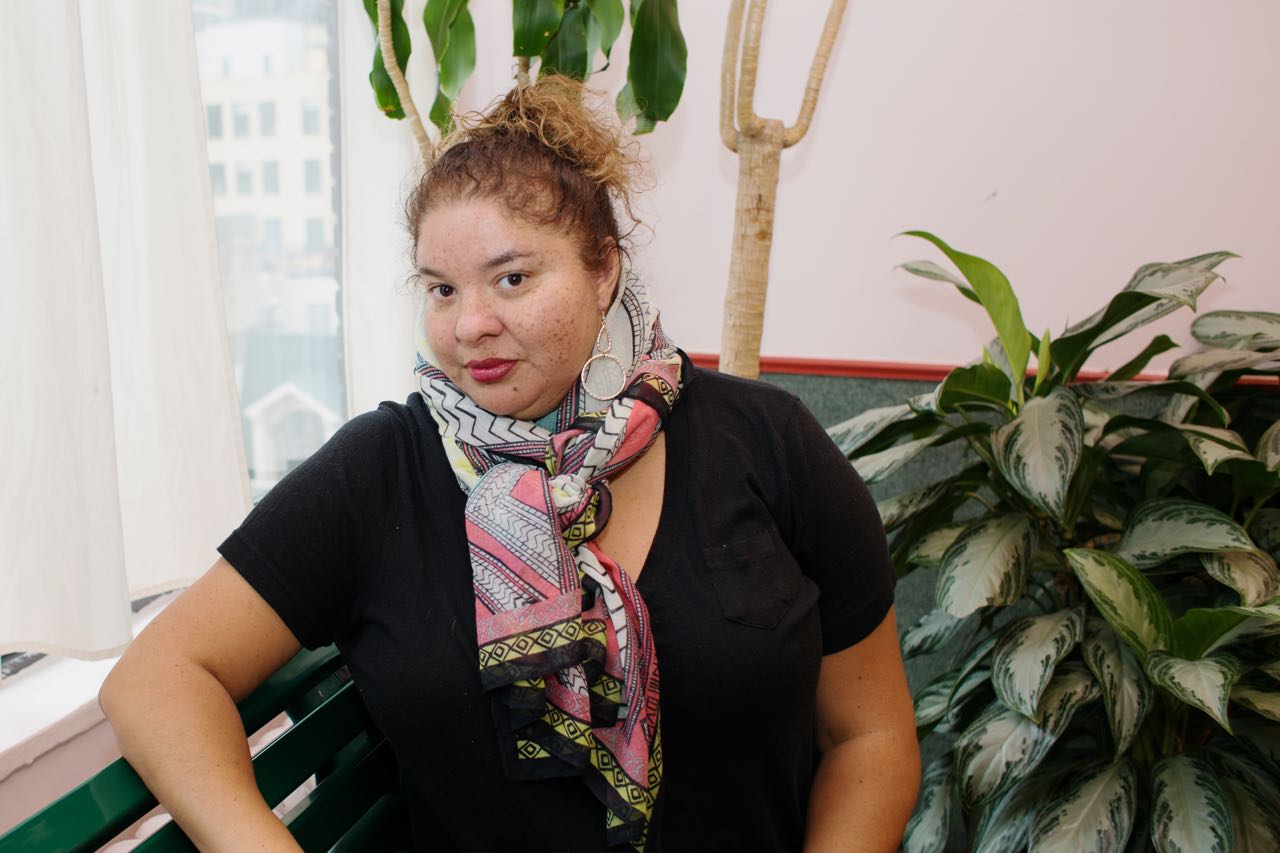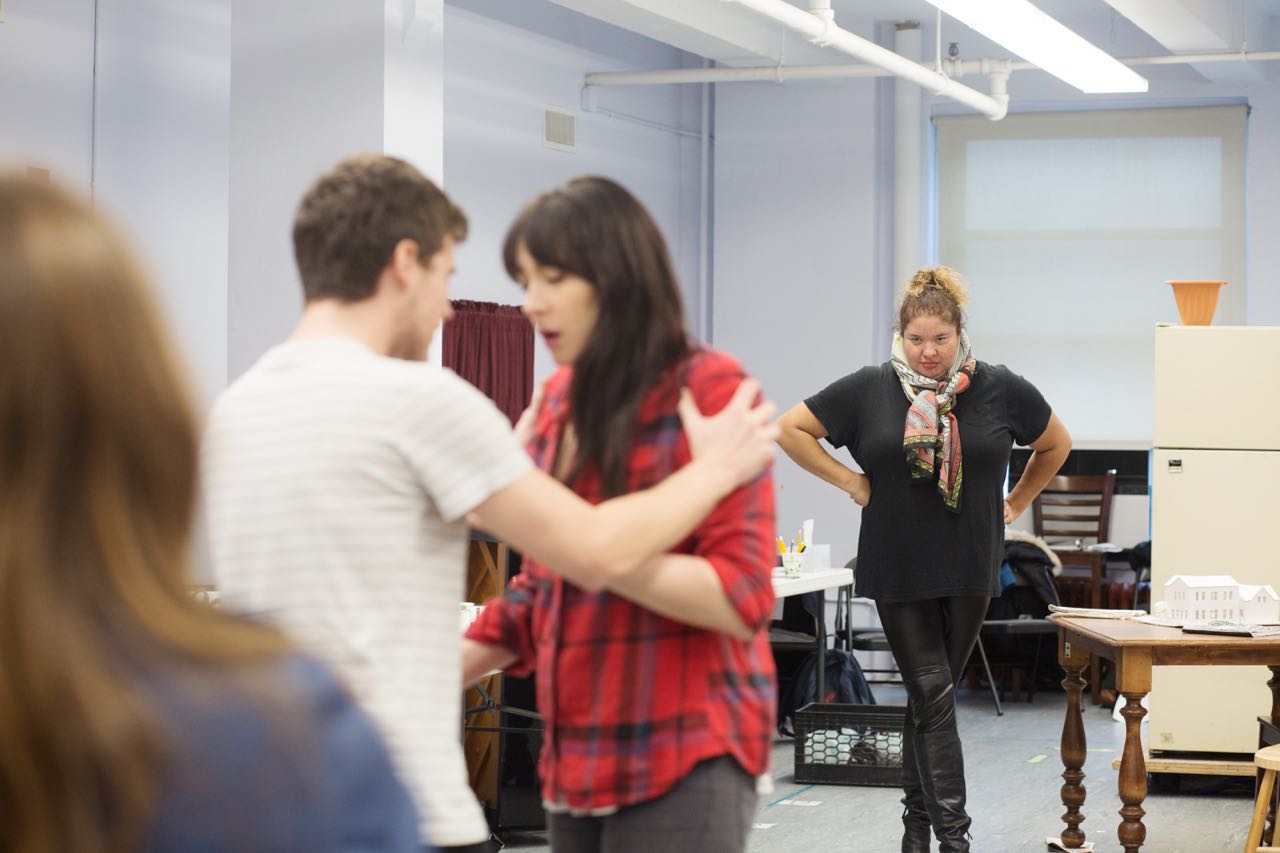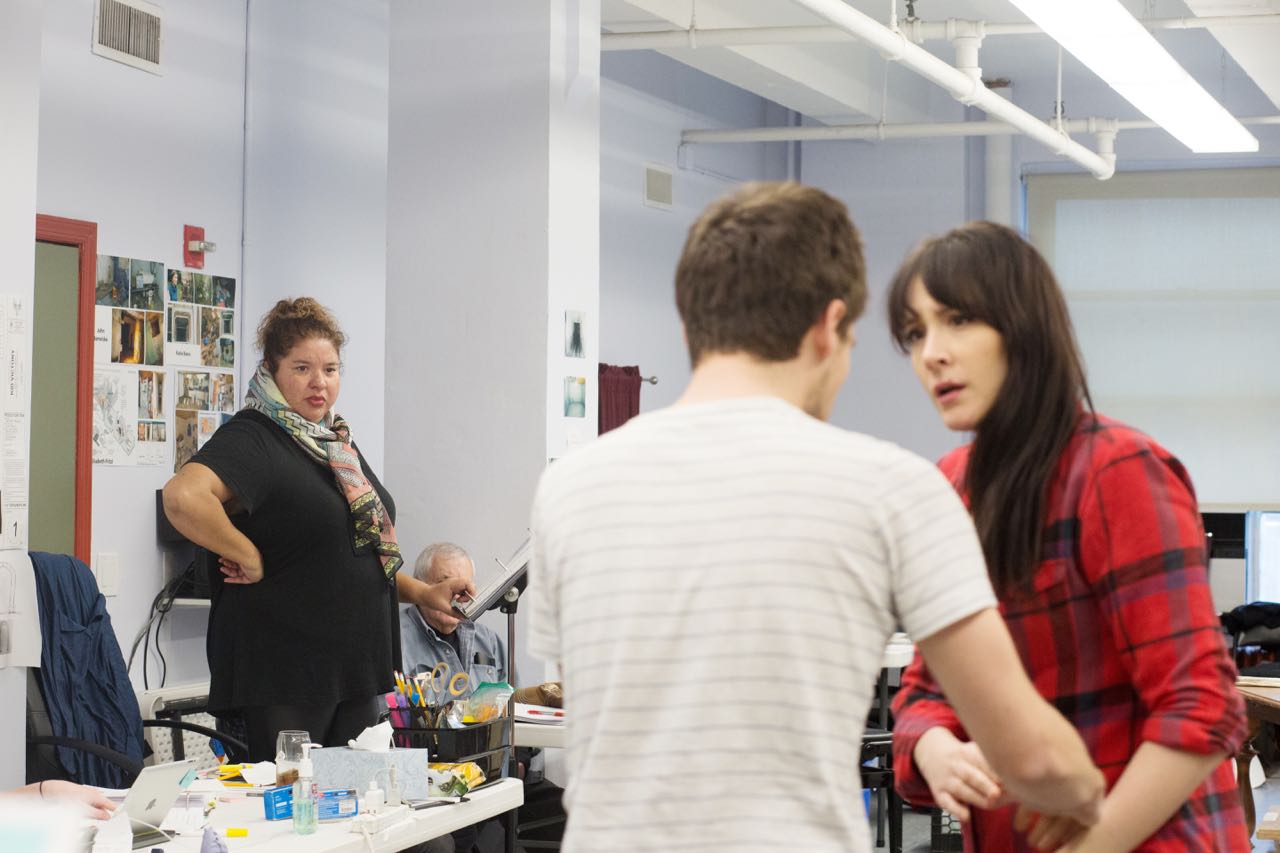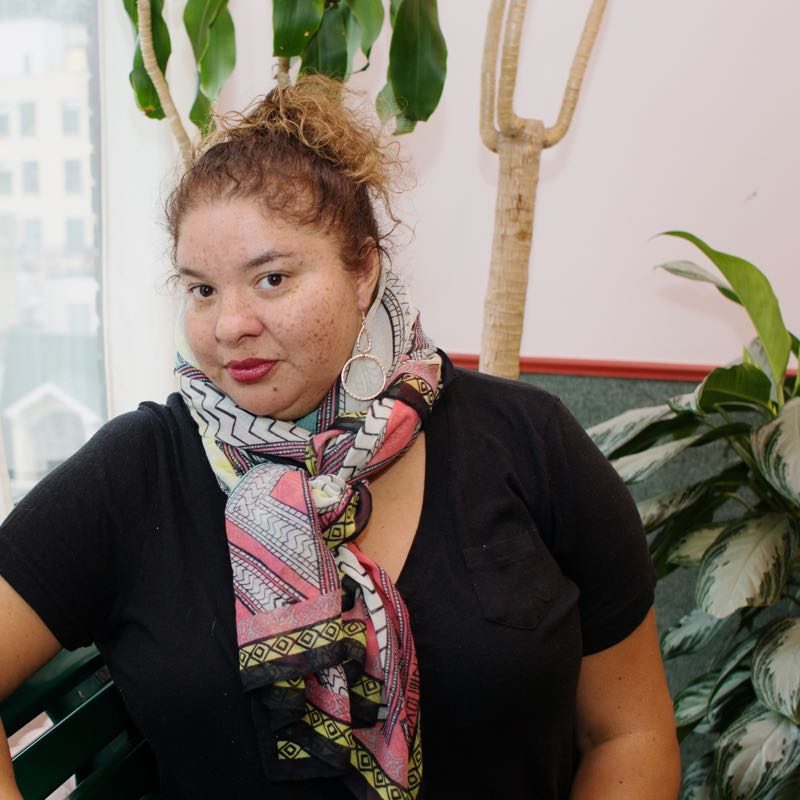Musical Theatre Craft and Influences: Liesl Tommy

Written by Victoria Myers
Photography by Tess Mayer
February 9th, 2017
In 2014, a production of Les Mis at the Dallas Theater Center was hailed as revolutionary, despite the fact that not a word of the libretto was changed. That production was conceived and directed by Liesl Tommy. Yet, for two years after that, Liesl directed a string of plays and didn’t direct another musical till Party People at the Public Theater in late 2016. We spoke to Liesl about her process and more in early 2016 when she was directing Eclipsed, a show that would earn her a Tony nomination for Best Director of a Play, She’s currently directing Kid Victory, a new musical by John Kander and Greg Pierce at the Vineyard Theatre, and so we sat down again with Liesl during a break from rehearsal, this time to discuss her relationship with musicals, her process for them, and what other areas of culture affect her work.
What is the first musical that you remember having some sort of impact on you, either positively or negatively?
I think the first movie musical I ever saw was Oklahoma. All of the musicals I encountered, I first encountered them as films. I didn’t grow up in a theatregoing family. I loved them. I watched them over and over again. If they were on the television, I recorded them on VHS. I remember I had a recording of My Fair Lady that I used to watch over and over again. I’d written My Fair Lady on the tape and then drew these big eyes with giant eyelashes. I just loved it. Another movie I loved, for some reason, was Gigi. I loved the music and the dancing, and the feeling of being transported. Where I grew up, in South Africa, that was such an escape. I think my mom named me Liesl after the character Liesl from The Sound of Music, which I think, for her, was also an escape. There are a lot of girls names Liesl in South Africa who are my age, and a lot of it has to do with that musical, I think. It was so transporting, and it felt like you were in a dream. It’s very interesting. Then what’s really ironic and magical for me about this production [Kid Victory] is that when I saw Cabaret for the first time, it totally was a synthesis of everything that I cared about. It was a musical, but it was also political. It was also surreal. All of these art forms and all of these ideas that I really cared about came together for the first time in the form of a musical. I loved musicals, but they felt a lot like escapism. I watched Cabaret over and over again. You can imagine how overwhelmed I was when they reached out to me and asked if I wanted to direct a musical written by John Kander. Cabaret led me to Bob Fosse, and Bob Fosse then became another source of obsession for me. This is all before I even thought of being a director, but just as a young person who was obsessed with all the kinds of ways that art manifests itself and the way the storytelling manifests itself.
How old were you when you first saw Cabaret?
I think I was maybe late teens.
Do you feel like first encountering musicals in movie form affected how you put them on stage and how you see them?
The very first show I did in New York that got any attention was a musical—a play that I turned into a musical for the Fringe called Two Girls from Vermont. It was an adaptation of Two Gentlemen of Verona. It put girls in the center of it. I used all this pop music as the music. For me, why I love musicals as much as I do is the same reason why I love Shakespeare, because it’s hyper-theatrical. You just basically take all of the tools of theatrical storytelling. You get to use every single one of them. You get to use dance, you get to use music, you get to use acting. Once a song is happening, you can elevate the design as well. For me, it is the essence of heightened theatricality. I love that. It just feels like there are no limits. Once someone is singing on stage, all bets are off. It can be as fantastical and theatrical as possible, or as simple and raw as possible. I feel like I get to play with all the tools in the tool kit.
That’s interesting because there are still people who view musical theatre as the lesser art form.
That’s not the type of thing that I do, and it can be challenging for the average musical theatre actor because I definitely approach it like a play. I do table work for way more days than people are comfortable with. They don’t get to sing when we’re doing table work. They have to approach the songs like monologues and the text analysis is really intense. For me, in no way do I approach it as a lesser art form, but I’m also working on really fantastic material that deserves that kind of excavation. I feel like even when I’m directing a straight play, music is always a huge part of the storytelling, it’s a huge part of the sound design, it’s a huge part of the way that the story is presented. It doesn’t feel like a huge shift to be doing musicals instead of plays or plays instead of musicals.

A few years ago you did a production of Les Mis that was thought to be more political than other productions. Could you talk a little about pulling out the political themes and social themes in musicals?
After Les Mis people kept asking me, how did you do that? I didn’t understand the question because I felt like what I did was just what I would do—it’s what I’m going to be doing with the Macbeth that I’ve got coming up, and what I did with the Hamlet that I did around that same time—which is look at the script, do all my text analysis, figure out what the central themes that the writers are exploring are, and then figure out how to make it as personal as possible for me. How to make it as accessible and challenging at the same time for a 21st century audience, and where at no point is anybody ever watching anything that feels theoretical or that feels easy. When I did Les Mis, I thought about the Dallas audience, “How do I keep that Dallas audience—a really comfortable, fairly wealthy community—from looking at this as just a fable?” The question I asked myself was, “What would have to happen in America in order to make students in a city like Dallas take to the streets?” That’s how I created that particular production. Parents and students could really connect in a visceral way with that story. I feel like that’s just my job. I’ll be doing Macbeth in D.C., and I’m asking myself the same questions about the D.C. audience and the time we’re living in.
To do musicals well, no matter what the subject, is a pretty rigorous process.
It’s incredibly rigorous. Your ability to collaborate has to be at a very high level because you’ve got to be working with a music director, you’ve got to be working with a choreographer, and you’ve got to create a space where everybody feels comfortable to give their best work, and it’s not territorial. You’re basically creating one mind, in terms of those three collaborators, but at the same time you want to create a space where people can challenge each other in a healthy way. You can really fight for clarity of storytelling on all three levels. That takes a certain amount of work. For me, I love musicals because I feel like I have a team in the rehearsal room with me every day and that’s super fun. If you’re a collaboration junkie like I am, then it’s just the more people in there making it happen, the more fun it is.
Why do you think musicals sometimes get a bad rap and are sometimes seen as a lesser form of theatre?
I think a lot of times, like when you do summer stock, there’s no time and there’s a lot of repeating—people just take that thing that was done on Broadway and they recreate it. It’s all very fast, and you are just basically telling actors where to go and how to do it. And sometimes that feels superficial. I think that’s where the bad rap comes from, where it feels like it’s just sort of performative and it hasn’t got depth. But I don’t think it has to be that way.
What was the first musical that you saw on stage that kind of blew your mind?
When I saw Ragtime on Broadway when I was in school. That blew my mind because, like Cabaret, it was political, and the book was beautiful and the music was astounding and I thought the staging was incredible. It was, again, a reminder to me that the synthesis of social commentary, entertainment, and musicals can all happen at once. I think I saw that three or four times. The other musical that I saw three or four times was Chicago. I also love choreography. I was dancer for a lot of my youth. I felt like I was able to go back in time with that. Those are the two musicals that really just opened up my world.
You mentioned Fosse before—were there other choreographers that had a big impact on you?
I saw Contact when that first came out and I thought it was sublime, it was heaven. That was exciting because I felt like I saw Susan Stroman pour her heart and mind onto the stage. That was really inspiring. It was bold, and like people were creating pathways for new ideas.

Are there other areas of culture, like visual arts, that have influenced you and how you direct?
Photography is a huge part of my kind of storytelling arsenal. When it’s a straight play I listen to a lot of music to help me solidify the visuals. But photography and painting are a big part of how I train myself in composition. I didn’t study directing at school, I studied acting. My father was a passionate amateur photographer, and he had a lot of photography books. I remember as a little kid sitting at the bookshelf pulling out all those photography books and just paging through these iconic images. He had a lot of Time Life books and I remember looking at and just constantly obsessing over these images, and learning what mythic moments in human history look like. Moments like after JFK died, and Louie Armstrong is playing and the slow tears are coming down his face. These kinds of images have become embedded and they work their way into your art. You start to understand the human condition in a way that is bigger than the life you’ve lived. Those photographs, it’s epic storytelling. That is huge influence.
Were there specific photographers or photographs, or even styles, that you used for Kid Victory?
For this, I looked at a lot of images of Brutalist Russian bus stops. From the Soviet Union there are all these crazy images of these bus stops that were designed in the Brutalist architectural style. I was mesmerized by them. And then also images of the woods. I looked at a lot of woods for this show, very different kind of woods. Another thing that I looked at was Butoh. Greg Pierce, the playwright, and I talked about it once, and then a good friend of mine gave me a book on Butoh photography for Christmas. I was obsessively looking at that, and then that led me down a rabbit hole of very early Butoh and when it was placed in the countryside. The amazing thing about being an artist is the rabbit hole that you can go into and where you find your inspiration.
Can we just go back to the Soviet bus stops? That is unexpected.
It’s architecture as well as photography. That’s the thing about being a director—you work in imagery so much, or at least I do, and you dream about the visual storytelling so much that things get locked in and you just can’t stop looking at them. There isn’t necessarily linear reasoning why you’re connecting to those images for this play, but it’s emotion. You’re connected to emotion.
What comes to my mind with the bus stops is they’re very stark, and the tone is kind of like the opposite of how one thinks of most musicals.
Exactly. In a way, that’s the architectural metaphor for the central character [in Kid Victory]. I just articulated that for the first time. I didn’t know why I was looking at it until I just said it right now. I guess that is what I was obsessing over. I kind of had a visual template for the emotional state of the central character.
Do you find, in general, that your brain tends to work in a way where the things you’re drawn to and get inspired from are things that if you told them to somebody else they’d be like, “Huh? That’s confusing,” or, “Yes, that makes total sense”?
I think a lot of the time people would probably go, “I have no idea.” I haven’t shared my research with the cast because I think it would just be confusing for them, but that’s okay. The stuff that I think is going to help, I bring in. The set designer and the costume designers have terrific research that’s super helpful. Then some things are private, some things are for my process. I don’t need to necessarily download everything in my brain onto the company.
Besides visual arts, is there anything else, like poetry or novels, that you use?
It’s really the visual. I read a lot of poetry in my life because I find it calming. It’s hard for me, I’m a news junkie. I read a lot of news, too much news. It’s hard for me to read fiction when I’m working on a show because I’m quite obsessive about the story that I’m working on and unpacking, so other narratives just fuck with my brain. I can’t even really focus. It’s like my brain just drifts over the characters in the show that I’m working on. While I’m a voracious reader, it’s usually non-fiction or essays or news.
When you’re working on a show, if you go to a museum or if you’re just out and about, are you constantly seeing everything through the lens of how it could apply to the show?
I am. One of my ex-boyfriends used to say, “Can you come back?” If we were walking down the street, I would just kind of drift into a kind of meditative space as I saw things that triggered connections. I’m always finding connections to things. As you get older and more mature, you figure out how to control that a little bit more. A big part of nurturing your ideas is making an opening for them and for those connections to be made.
We talked about new work development before, but what’s something you think, specifically for musicals, could be improved with the development process?
I guess the hardest part about musicals is it’s really wrapped up in commerce, more than anything else. They’re expensive to make and they’re expensive to develop. I think there is a sense that if you’re going to do a musical, we’re hoping that it’s going to become a commercial entity. Then if you’re going to make a musical commercial, it’s going to kind of limit the scope of the content. No one wants to see an Eclipsed musical, right? Which is why musicals like Ragtime and Cabaret are so magical, because they really are about something that matters. So I think the thing that you wrestle with always in the creation of a new musical is that, on some level, there’s a hope that it will be commercial, which I think sometimes dictates how deep you go.
Do you have a dream cultural collaboration?
I would love to do another musical with Kander. I would love to revive one of Kander’s old musicals, because I just feel like having been in the room with him, I really have an insight into the way the music is put together. The passion I had for it before has just deepened with intimacy. That is definitely something I would like to do.

